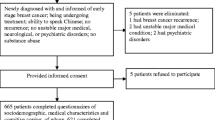Abstract
This study assessed the influence of cognitive processing variables on cancer worries and distress after breast cancer treatment. In multivariate analyses, while independent variables were intolerance of uncertainty and intrusive thoughts, constructs' variables were anxiety and depression symptoms and cancer-related worries. The intolerance to uncertainty had a tendency to influence on distress and concerns about cancer after the end of treatment (Wilks' λ = 0.687, p = 0.074). Whereas, thought intrusion had a significant influence on distress and cancer related worries (Wilks' λ = 0.228, p = 0.000). Cognitive variables could be addressed by the oncology nurse when considering the patients' concerns related to cancer and psychological distress.
Similar content being viewed by others
References
Costanzo ES, Lutgendorf SK, Mattes ML, Trehan S, Robinson CB, Tewfik F, Roman SL (2007) Adjusting to Life after Treatment: Distress and Quality of Life following Treatment for Breast Cancer. Br J Cancer 97:1625–1631
Cappiello M, Cunnigham RS, Knobf MT, Erdos D (2007) Breast Cancer Survivors. Information and Support after Treatment. Clin Nurs Res 16(4):278–293
Hay JL, Buckley TR, Ostroff JS (2005) The role of cancer worry in cancer screening: A theoretical and empirical review of the literature. Psycho-Oncology 14:517–534
Freeston MH, Rheaume J, Letarte H, Dugas MJ, Ladouceur R (1994) Why do People Worry? Pers Individ Differ 17(6):791–802
Dugas MJ, Freeston MH, Ladouceur R (1997) Intolerance of Uncertainty and Problem Orientation in Worry. Cogn Ther Res 21(6):593–606
Han PKJ, Moser RP, Klein WMP (2006) Perceived ambiguity about cancer prevention recommendations: Relationships to perceptions of cancer preventability, risk and worry. J Health Commun 11:51–69
Segerstrom SC, Tsao JCI, Alden LE, Craske MG (2000) Worry and Rumiation: Repetitive Thought as a Concomitant and Predictor of negative Mood. Cogn Ther Res 24(6):671–688
Beck R, Perkins TS, Holder R, Robbins M, Gray M, Allison SH (2001) The Cognitive and Emotional Phenomenology of Depression and Anxiety: Are Worry and Hopelessness the Cognitive Correlatesof NA and PA? Cogn Ther Res 25(6):829–838
Cella D, Mahon S, Donovan M (1990) Cancer Recurrence as a Traumatic Event. Behav Med 16:15–22
Lerman C, Lustbader E, Rimer B, Daly M, Millar S, Sands C, Balshem A (1995) Effects of Individualized Breast Cancer Risk Counseling: a Randomized Trial. J Natl Cancer Inst 87(4):286–292
Lewis JA, Manne SL, DuHamel KN, Vickburg SMJ, Bovbjerg DH, Currie V, Winkel G, Redd WH (2001) Social Support, Intrusive Thoughts, and quality of life in Breast Cancer Survivors. J Behav Med 24(3):231–245
Karnofsky DA, Abelman WH, Craver LF, Burchenal JH (1948) The use of nitrogen mustards in the palliative treatment of carcinoma. Cancer 1:634–56
Lerman C, Trock B, Rimer BK, Boyce A, Jepson C, Engstrom PF (1991) Psychological and Behavioral Implications of abnormal Mammograms. Ann Intern Med 114:657–661
Cabrera E, Zabalegui A, Gil F, Llort G, Blanco I (2007) How to Measure Cancer Worry: Transcultural Validation of a Cancer Worry Scale. Psycho-Oncology 16:S179
González M, Cubas R, Rovella AT, Darias M (2006) Adaptación Española de la Escala de Intolerancia hacia la Incertidumbre: Procesos Cognitivos, Ansiedad y Depresión. Psicología y Salud 16(2):219–233
Weiss DS, Marmar CR (1997) The Impact of Event Scale- Revised. In: Wilson JP, Keane TM (eds) Assessing psychological trauma and PTSD: a handbook for practioners. Guilford, New York, pp 399–411
Costa-Requena G, Gil FL (2007) Propiedades Psicométricas de la Escala Revisada del Impacto del Evento Estresante (IES-R) en una Muestra Española de Pacientes con Cáncer. Análisis y Modificación de Conducta 33(149):311–331
Creamer M, Burgués P, Pattison P (1992) Reaction to trauma: A cognitive procesing model. J Abnorm Psychol 191:452–459
Zigmond AS, Snaith RP (1983) The Hospital Anxiety and Depresión Scale. Acta Psychiatr Scand 67:361–370
Costa-Requena G, Pérez X, Salamero M, Gil FL (2009) Discriminación del malestar emocional en pacientes oncológicos utilizando la escala de Ansiedad y Depresión Hospitalaria (HADS). Ansiedad y Estrés 15(2–3):217–229
Deshields T, Tibbs T, Fan M-Y, Bayer L, Taylor M, Fisher E (2005) Ending treatment: the course of emotional adjustment and quality of life among breast cancer survivors immediately following radiation therapy. Support Care Cancer 13:1018–1026
Hay JL, McCaul KD, Magnan RE (2006) Does worry about breast cancer predict screening behaviors? A meta-analysis of the prospective evidence. Prev Med 42:401–408
Mathews A, Ridgeway V, Warren R, Britton P (2002) Predicting worry following a diagnosis of breast cancer. Psycho-Oncology 11:415–418
Booth K, Beaver K, Kitchener H (2005) O´Neill J, Farrell C. Women’s experiences of information, psychological distress and worry after treatment for gynaecological cancer. Patient Educ Couns 56:225–232
Acknowledgements
We thank those cancer patients who kindly volunteered to participle in this study.
Author information
Authors and Affiliations
Corresponding author
Additional information
Ethical Approval
The study was approved by the institutional reviews boards and by the Ethics Committee from Duran i Reynals Hospital, and all participants gave informed consent.
Supported
This research was supported by the Catalan Agency for Health Technology Assessment and Research (No. 102/19/2004).
Rights and permissions
About this article
Cite this article
Costa-Requena, G., Rodríguez, A., Fernández, R. et al. Cognitive Processing Variables in Breast Cancer: Worry and Distress at the End of Treatment. J Canc Educ 26, 375–379 (2011). https://doi.org/10.1007/s13187-010-0140-8
Published:
Issue Date:
DOI: https://doi.org/10.1007/s13187-010-0140-8




